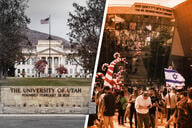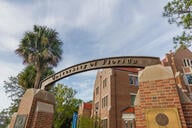You have /5 articles left.
Sign up for a free account or log in.
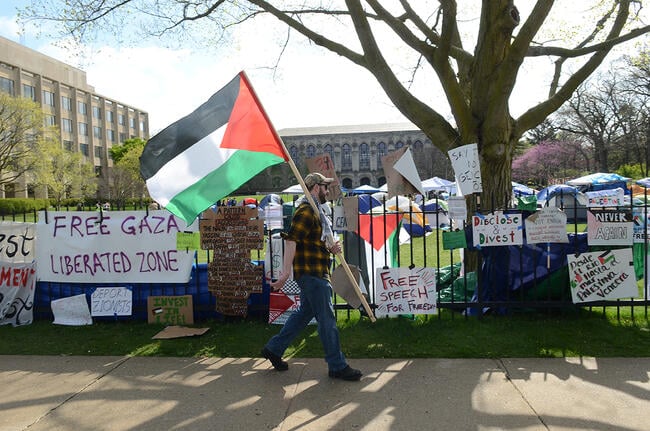
Protesters at Northwestern University, April 27, 2024.
Jacek Boczarski/Anadolu/Getty Images
Last spring, as pro-Palestinian demonstrators set up encampments from coast to coast, a small number of college presidents struck agreements with students to get them to pack up their tents.
But a year after those protests ended, have the presidents lived up to their promises?
While the agreements varied widely by campus, the answer appears to mostly be yes, though many initiatives are still in progress.
Divestment from Israel or companies with ties to the Israeli government or military was the most common demand student protesters made, and while some presidents agreed to hold votes on the issue, they made no promises about how such decisions would go. In the vast majority of cases, universities outright rejected divestment demands; on rare campuses where administrators agreed to divest, the actions were largely contained, focused mostly on defense contractors.
Beyond divestment votes, colleges also struck agreements on multiple other points, including scholarships for displaced Palestinian students and increased support for Muslim students. Here’s a look at where such promises stand a year after the encampment protests ended.
Northwestern University
Few protest deals made more headlines than the one at Northwestern University, where President Michael Schill signed on to the Dearing Meadow agreement, as it came to be known, in late April of last year. Schill agreed to various concessions in exchange for protesters concluding the encampment. Those promises included support for Palestinian students and visiting Palestinian faculty, more space for Muslim student groups, and greater transparency in how the university invests its $14.3 billion endowment.
In signing the agreement, Schill caught the attention of Congress, which summoned him for a hearing last May alongside the leaders of Rutgers University and the University of California, Los Angeles. Schill defended the agreement, pushing back on GOP scrutiny.
The Daily Northwestern, the university’s student newspaper, confirmed that Schill has followed through on various initiativess; the university is currently supporting at least one Palestinian scholar and providing temporary space for Muslim students and the Middle Eastern and North African Student Association. (Renovation for a permanent space is ongoing.) The newspaper also confirmed that Northwestern added support for Jewish and Muslim students through the office of Religious and Spiritual Life, which funds weekly Shabbat dinners. But Northwestern officials have been reticent to discuss such efforts, ignoring requests for comment from the student newspaper and Inside Higher Ed.
(Multiple student activists also did not respond to requests for comment from Inside Higher Ed.)
Despite promising more transparency on its endowment, Northwestern does not appear to be living up to that part of the deal. According to the agreement, Northwestern “will answer questions from any internal stakeholder about specific holdings, held currently or within the last quarter, to the best of its knowledge and to the extent legally possible.” Officials promised to respond to such inquiries within 30 days or, if unable to do so, to “provide a reason and a realistic timeline.”
However, The Daily Northwestern reported last month that it sent officials questions about endowment holdings in February and did not receive a response within 30 days. The student newspaper noted that Northwestern did not provide a reason for the delay or a timeline for a response. A student reporter told Inside Higher Ed that the newspaper followed up on March 30 and the university then referred the questions to the Advisory Committee on Investment Responsibility.
The Daily Northwestern is still awaiting answers.
Rutgers University
Rutgers also struck a deal with encampment protesters last spring. As at Northwestern, that agreement landed then-president Jonathan Holloway in front of Congress mere weeks later.
Rutgers leaders agreed to eight of the students’ 10 demands; while they rejected calls to divest from Israel and terminate a partnership with Tel Aviv University, they agreed to accept 10 displaced Gazan students, establish Arab cultural centers at each Rutgers campus, seek a partnership with Birzeit University in the West Bank, hire faculty members who specialize in Palestinian and Middle East studies, and release a statement calling for a ceasefire, among other concessions.
Rutgers officials said all of the agreed-upon initiatives are currently in progress.
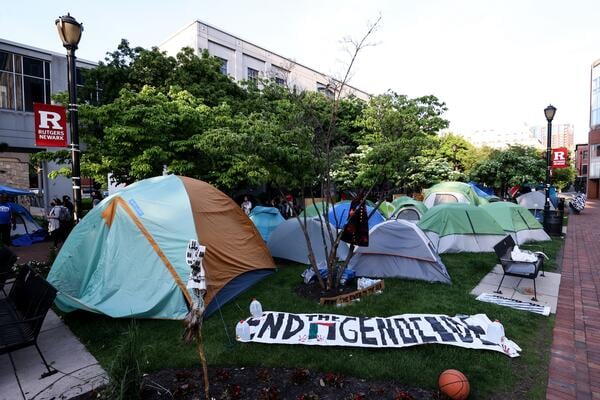
Anadolu/Getty Images
“Work continues to advance a series of actions we believe will strengthen and build upon positive change across our community,” spokesperson Megan Schumann told Inside Higher Ed. “These efforts are grounded in the university’s values of free expression, inclusion, and mutual respect—and in the fundamental right of all members of our community to learn, teach, and carry out the university’s essential work in a safe and supportive environment.
University of Oregon
At the University of Oregon, the administration’s agreement with protesters included a statement calling for a ceasefire and condemning genocide, the addition of visiting scholars with expertise in Palestine and Israel, support for academics displaced by the war, new faculty hires with related expertise, new cultural spaces, and more.
Officials said they have lived up to their end of the agreement, though some initiatives are still underway. They noted that the university has already awarded its first International Crisis Response Scholarship, which was established by the agreement to support students affected by the conflict, and the recipient has begun studies at UO. The university has also funded two speaking events as part of its Special Initiative on Constructively Engaging the Conflict and the Pursuit of Peace in Palestine/Israel. Another five proposals for speaking events have already been approved, according to officials. Past and upcoming events have focused on topics such as Palestine and the future of U.S. campus activism and Palestinian identity.
Other efforts, such as faculty recruiting, are ongoing, with several academic units submitting hiring-plan proposals that are undergoing a standard review process. Plans to forge partnerships with Birzeit University in the West Bank and several universities in Israel are also underway.
Evergreen State College
The public institution in Washington agreed to various concessions in a deal with protesters. Officials launched four committees to work on different issues, including “divestment from companies that profit from gross human rights violations and/or the occupation of Palestinian territories,” according to language in the signed protest agreement. Another task force will develop policies to determine whether the college should accept or reject grants that “facilitate illegal occupations abroad, limit free speech, or support oppression of minorities.” The other two task forces are slated to review policing at Evergreen State and to develop a new “non–law enforcement” model for crisis responses.
President John Carmichael also kept his promise to protesters by making a statement on the bloodshed in Gaza last May, in which he called for a ceasefire, the release of hostages and the restoration of international law, which he wrote “requires that the International Court of Justice fairly adjudicate charges of genocide.” He also urged the university community to be “on guard against Islamophobia and antisemitism as we engage with each other in this moment.”
Those efforts are ongoing; the agreement provided a timeline for the task forces to complete their work, with deadlines to adopt their recommendations ranging from spring 2026 to 2030.
California State University, Sacramento
When Sacramento State struck an agreement with pro-Palestinian protesters last May, students framed the move as divestment in a social media post. But a more accurate reading would be that the university determined it did not have direct investments in companies profiting off the war effort and declared that it would not pursue such holdings. The university also established a “de minimis policy for indirect investments that prioritizes socially responsible investments,” a spokesperson wrote to Inside Higher Ed.
Sacramento State president Luke Wood said at the time, “The finance committee of our University Foundation has been so committed to socially responsible investments that we have no direct investments in any of the companies about which many of our students have concerns.” He also announced a policy to formalize socially responsible investment practices, in order to “avoid funding students’ education based on companies that profit from war and desolation,” the spokesperson said.
University leaders announced multiple other actions at the same time, which Wood said grew out of listening sessions with over 1,500 students, faculty, staff and alumni that began when he arrived the previous year. Those changes include introducing more halal and kosher food options on campus, new cultural centers and training on Islamophobia and antisemitism, as well as university task forces to address both Islamophobia and antisemitism. Other efforts include the development of recruitment plans to attract Palestinian and Jewish students to the university.
(This section has been updated to incorporate the university's response.)
Sonoma State University
Sonoma State University may offer the most visible case of promises made and broken.
Last spring, then-president Mike Lee agreed to demands from protesters that included reviewing contracts to consider divestment opportunities, introducing a Palestinian studies curriculum and adding Students for Justice in Palestine members to a Sonoma State advisory council. Most controversially, he agreed to what was effectively an academic boycott, promising not to “pursue or engage in any study abroad programs, faculty exchanges, or other formal collaborations that are sponsored by, or represent, the Israeli state academic and research institutions.”
However, the agreement was not approved by his bosses in the California State University system, prompting officials to walk the deal back and Lee to retire suddenly. A new deal put forward by an acting president who replaced Lee scrapped much of the prior agreement.
A campus spokesperson noted that despite the changes to the initial agreement, SSU Foundation officials met with students to discuss investment holdings and launched other actions, including a three-part lecture series providing “differing viewpoints on the situation in Gaza and differing religious perspectives,” as well as new groups to support Jewish life.
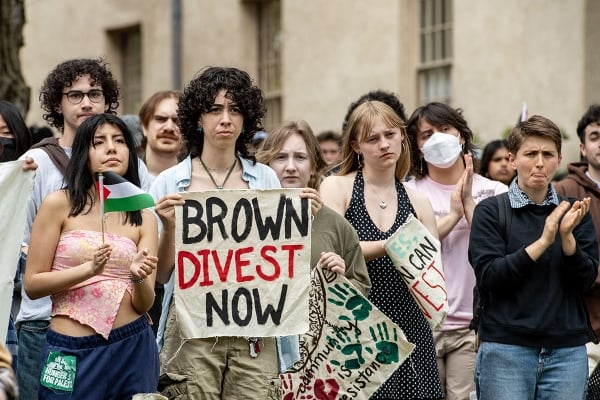
Protesters at Brown University demand divestment, April 29, 2024.
Joseph Prezioso/AFP/Getty Images
Divestment Demands
Multiple universities agreed to hold votes on some form of divestment in response to protesters, including Brown University, the University of Minnesota, the New School and others.
Governing boards, however, have largely rejected divestment except in a few cases.
The University of San Francisco announced several weeks ago that it would divest from four U.S. companies with ties to the Israeli military: Palantir, L3Harris, GE Aerospace and RTX Corporation. The university plans to sell off direct investments in those companies by June 1.
Nearby San Francisco State University has also adopted a form of divestment; in December, the public university’s governing board voted to add new investment screening policies. Now SFSU will no longer invest in companies that make 5 percent or more of their revenues from weapons manufacturing. SFSU also adopted more transparency around endowment holdings.


